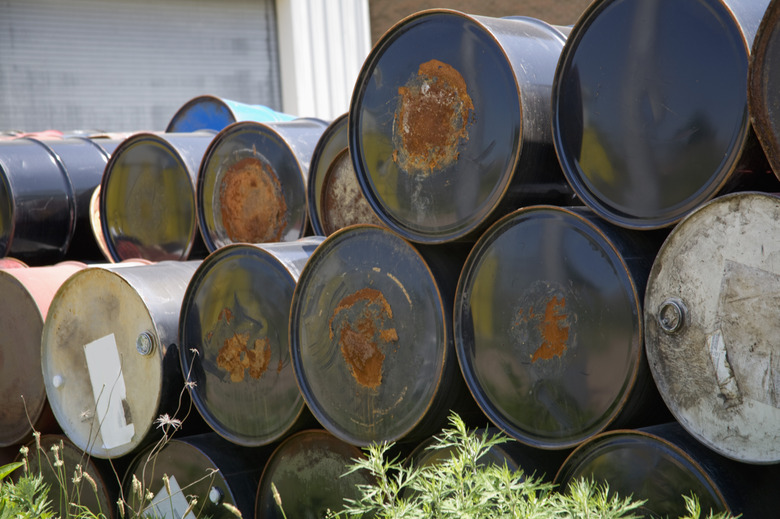How Land Pollution Affects Humanity
Humankind is the major cause of land pollution. Before the Industrial Revolution, which spanned roughly 1760 to 1850, people didn't have the technical ability to massively pollute the environment. They cut down forests, had human waste disposal problems and pollution from activities such as tanning leather, meat processing and mining, but nothing like the pollution levels that resulted from industrialization. Today's pollution sources affect large areas with serious contaminants that threaten human welfare.
Kinds of Pollutants
Kinds of Pollutants
There are many kinds and sources of pollution. Pollution occurs from deforestation — for logging, agriculture or development — and agricultural runoff, which carries pesticides and fertilizers. Heavy metals such as lead, arsenic and cadmium come from mining activities and industrial wastes. Persistent organic pollutants, or POPs, are toxic chemicals resulting from industrial production, which has climbed dramatically from post-World War II to present time. POPs stay in the environment for a long time. Examples are commercial insecticides, polychlorinated biphenyls or PCBs, and dioxins. Other hazardous wastes harmful to humans include radioactive materials, organic solvents, acids and alkalis.
Human Health Concerns
Human Health Concerns
People who work in chemical plants, mines, as pesticide applicators, or who live near unsafe hazardous waste disposal sites risk direct exposure to pollutants. Toxic chemicals can be inhaled, enter through the skin, or be eaten with food and water. Heavy metals such as lead, cadmium, chromium and arsenic are carcinogens, affect reproduction, and can cause death. Humans exposed to POPs can have developmental, behavioral, endocrine, reproductive, neurological and immunological health problems, according to the U.S. Environmental Protection Agency (EPA). Pesticides can affect the nervous and endocrine systems, cause skin or eye irritation, or cause cancer, depending on the type of pesticide and level of exposure.
Food Safety
Food Safety
Many toxic pollutants enter plants from contaminated soil. The toxins in contaminated plants accumulate in the tissues of animals that consume the plants and pass up the food chain to higher trophic levels, as each animal in the food chain becomes prey. Some contaminants increase in concentration in tissues from one trophic level to the next, a process called biomagnification.
PCBs and dioxin-like compounds accumulate in fatty tissues of animals and humans. Humans acquire dioxins by eating contaminated meat, dairy products and fish. Exposure to PCBs before birth can cause hyperactivity, lower IQ, delayed reading, and shortened attention span, according to the Institute for Health and the Environment at the University at Albany. Dioxins are carcinogenic and affect the fetal endocrine system. Pesticides are widely used in agriculture and can be persistent on crops after harvest. The EPA sets standards on pesticide use, including evaluating a "reasonable certainty of no harm" by pesticide residues on food plants.
Water Safety
Water Safety
Land pollution is a worldwide problem, and many toxic chemicals get transported far from the site of origination by water and wind. Both surface water and groundwater can carry pollutants leached from the soil and spread them over a wide area, often crossing national and international boundaries. Drinking water can become contaminated by improper disposal of human waste, causing diseases such as cholera, typhus and dysentery, which are serious problems in developing countries.
Land Pollution and Global Climate Change
Land Pollution and Global Climate Change
Another major concern with land pollution impacts humanity at a global scale rather than a local one. Global climate change results in changing temperatures and more severe weather patterns that impact all of the people on our Earth. Land pollution, particularly land degradation and deforestation, exacerbates the effects of global climate change by releasing carbon that was formerly trapped in the soil.
Reducing current land pollution and reversing the damage that has already been completed is an important step in stopping the advancement of global climate change.
References
- Yale-New Haven Teachers Institute: The Industrial Revolution
- U.S. Environmental Protection Agency: Persistent Organic Pollutants: A Global Issue, a Global Response
- Kansas State University: Center for Hazardous Substance Research: Environmental Science and Technology Briefs for Citizens: Human Health Effects of Heavy Metals
- Stockholm Environmental Institute: Land Degradation Worsening Climate Change
Cite This Article
MLA
Csanyi, Carolyn. "How Land Pollution Affects Humanity" sciencing.com, https://www.sciencing.com/land-pollution-affects-humanity-23254/. 1 December 2021.
APA
Csanyi, Carolyn. (2021, December 1). How Land Pollution Affects Humanity. sciencing.com. Retrieved from https://www.sciencing.com/land-pollution-affects-humanity-23254/
Chicago
Csanyi, Carolyn. How Land Pollution Affects Humanity last modified March 24, 2022. https://www.sciencing.com/land-pollution-affects-humanity-23254/
